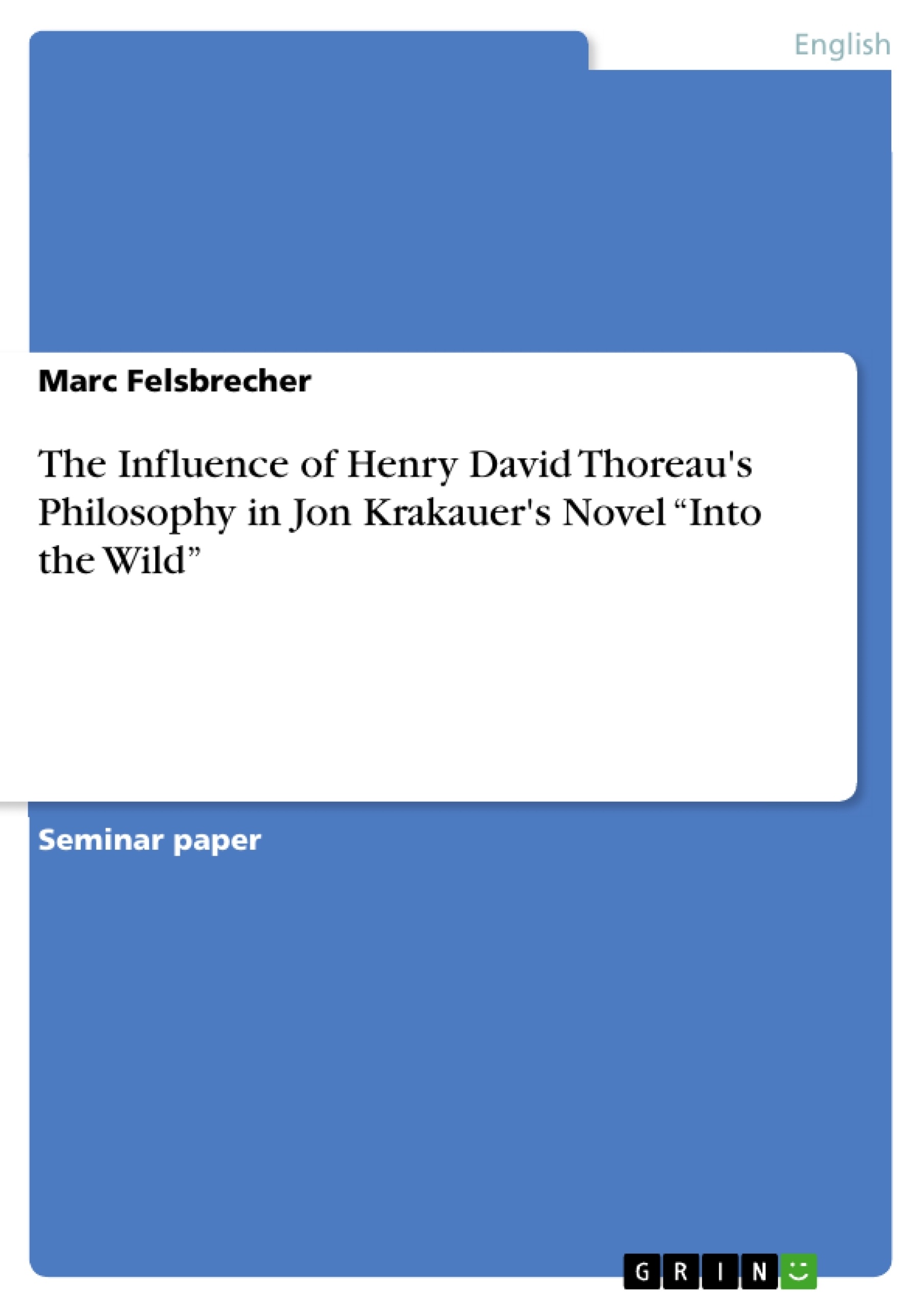The aim of this essay is to critically investigate Jon Krakauer’s use of the philosopher Henry David Thoreau’s ideas,
principles, notions and beliefs with the purpose of characterizing “Alexander Supertramp” in the book “Into the Wild”. The thesis of this paper is that Jon Krakauer uses Thoreau´s perceptions and views on society, nature and wilderness to interpret Christopher McCandless's actions and to illustrate his motives. Krakauer thereby characterizes McCandless as a late “Thoreauvian” transcendentalist. This essay will critically analyze Krakauer´s book and point out perceptions and ideas of Henry David Thoreau that Krakauer uses to illustrate and explain the protagonist`s actions according to his own perception. Differences and similarities between Thoreau and McCandless will also be discussed. The works cited by Thoreau will be
his essay “Civil Disobedience” (1849) and his book “Walden” (1854).
Table of Contents
- 1 Introduction: “Into the Wild” – The Story of Christopher McCandless
- 2 Thoreau's Philosophy in Jon Krakauer's “Into the Wild”
- 2.1 Life and Influence of Henry Thoreau
- 2.2 Thoreau in "Into the Wild"
- 2.3 Christopher McCandless - a modern Henry Thoreau?
- 3 Conclusion: Conflicting Perspectives on Christopher McCandless
Objectives and Key Themes
This essay critically examines Jon Krakauer's use of Henry David Thoreau's philosophy in his non-fiction narrative, "Into the Wild," to characterize Christopher McCandless. The main objective is to analyze how Krakauer employs Thoreau's ideas on society, nature, and wilderness to interpret McCandless's actions and motivations, portraying him as a modern-day Thoreauvian transcendentalist. The analysis will compare and contrast the philosophies of Thoreau and McCandless, focusing on Thoreau's "Civil Disobedience" (1849) and "Walden" (1854).
- The portrayal of Christopher McCandless in "Into the Wild."
- The influence of Henry David Thoreau's philosophy on McCandless's life choices.
- A comparative analysis of Thoreau's and McCandless's views on society and nature.
- Krakauer's narrative techniques and their impact on the reader's perception of McCandless.
- The critical reception of "Into the Wild" and the controversies surrounding McCandless's legacy.
Chapter Summaries
1 Introduction: “Into the Wild” – The Story of Christopher McCandless: This introductory chapter sets the stage by introducing Christopher McCandless, a young man who abandoned his comfortable life to pursue freedom and self-discovery in the Alaskan wilderness. It outlines McCandless's journey, his transformation into "Alexander Supertramp," and his ultimate tragic death from starvation and poisoning. The chapter also highlights the public fascination with McCandless's story and the subsequent publication of Krakauer's book, emphasizing the complexities surrounding McCandless's motivations and the diverse interpretations of his actions. It establishes the controversial nature of McCandless's choices and the varied responses they evoked, providing a context for the subsequent exploration of his life and philosophy.
2 Thoreau's Philosophy in Jon Krakauer's “Into the Wild”: This chapter delves into the central theme of the essay: the connection between Henry David Thoreau's philosophy and Christopher McCandless's life. It explores Thoreau's life and the influence of his transcendentalist beliefs, emphasizing the core tenets of his philosophy, specifically his views on civil disobedience, the importance of nature, and rejection of materialistic society. The chapter meticulously traces how Krakauer utilizes these themes to shape his portrayal of McCandless, highlighting specific instances in "Into the Wild" where Thoreau's ideas are explicitly or implicitly referenced. This section acts as a bridge, connecting the biographical details of McCandless’s life to the philosophical framework used to interpret it.
Keywords
Henry David Thoreau, transcendentalism, Christopher McCandless, Into the Wild, nature, wilderness, civil disobedience, societal rejection, self-discovery, biography, narrative interpretation, Alaska.
Frequently Asked Questions: Analysis of Jon Krakauer's "Into the Wild"
What is the main topic of this analysis?
This analysis critically examines how Jon Krakauer uses Henry David Thoreau's philosophy in his book, "Into the Wild," to portray Christopher McCandless. It focuses on how Thoreau's ideas about society, nature, and wilderness are used to interpret McCandless's actions and motivations.
What are the key themes explored in the analysis?
The key themes include the portrayal of Christopher McCandless, the influence of Thoreau's philosophy on McCandless's life choices, a comparison of Thoreau's and McCandless's views on society and nature, Krakauer's narrative techniques, and the controversies surrounding McCandless's legacy.
Which works of Thoreau are referenced?
The analysis specifically references Thoreau's "Civil Disobedience" (1849) and "Walden" (1854) to understand and interpret McCandless's actions and philosophies.
How is Christopher McCandless portrayed in the analysis?
The analysis explores multiple perspectives on McCandless, acknowledging the controversies surrounding his life and actions. It examines how Krakauer's narrative shapes the reader's perception of McCandless.
What is the role of Henry David Thoreau's philosophy in the analysis?
Thoreau's philosophy serves as a critical lens through which to understand McCandless's choices and motivations. The analysis compares and contrasts their beliefs about society, nature, and self-discovery.
What are the chapter summaries provided in the analysis?
The provided summaries detail the introduction of Christopher McCandless and his story, the exploration of Thoreau's philosophy and its connection to McCandless's life, and a concluding chapter offering different interpretations of McCandless's actions.
What are the objectives of this analysis?
The main objective is to analyze how Krakauer uses Thoreau's ideas to portray McCandless as a modern-day Thoreauvian transcendentalist. The analysis aims to compare and contrast the philosophies of Thoreau and McCandless.
What are the keywords associated with this analysis?
The keywords include Henry David Thoreau, transcendentalism, Christopher McCandless, Into the Wild, nature, wilderness, civil disobedience, societal rejection, self-discovery, biography, narrative interpretation, and Alaska.
What is the overall conclusion of the analysis?
The conclusion likely presents a nuanced perspective on McCandless's life and actions, considering the conflicting interpretations of his motivations and legacy, as highlighted in the chapter summaries.
- Quote paper
- Marc Felsbrecher (Author), 2014, The Influence of Henry David Thoreau's Philosophy in Jon Krakauer's Novel “Into the Wild”, Munich, GRIN Verlag, https://www.grin.com/document/307096




